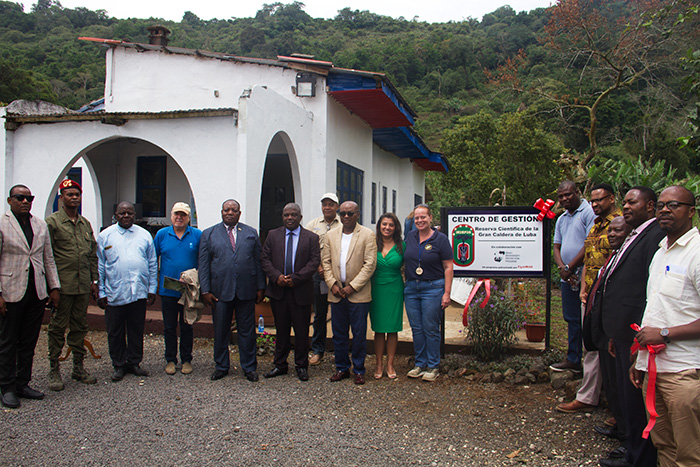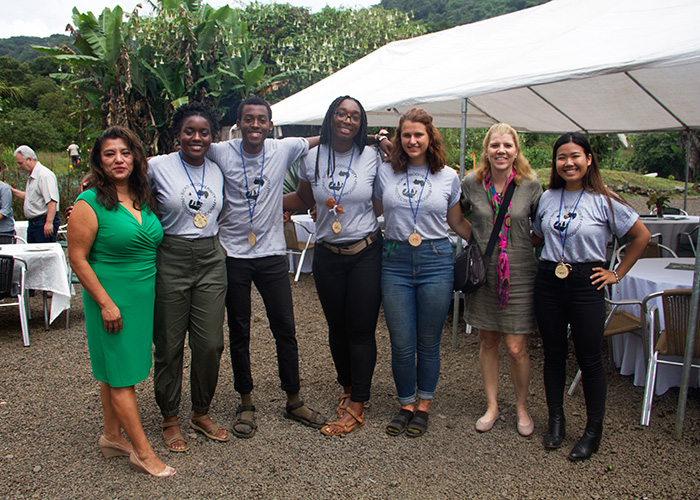With Newly Adopted Research Center, the Bioko Biodiversity Protection Program Welcomes CoAS Faculty and Students
By Kylie Gray
April 03, 2019
 Katy Gonder, PhD, and Maria Schultheis, PhD, with dignitaries in front of the newly adopted research center
Katy Gonder, PhD, and Maria Schultheis, PhD, with dignitaries in front of the newly adopted research center
This spring, faculty from the College of Arts and Sciences traveled to Equatorial Guinea to celebrate the official government adoption of the Bioko Biodiversity Protection Program’s scientific research center. The events not only highlighted the accomplishments of the program, but also shed light on opportunities for further collaboration with Drexel University researchers and students.
The BBPP, a research partnership between Drexel University and the National University of Equatorial Guinea, is Equatorial Guinea’s oldest conservation organization. Founded by Emeritus Biology Professor Gail Hearn, PhD, in 1998 and now directed by Associate Professor of Biology Mary Katherine “Katy” Gonder, PhD, the partnership protects the rich biodiversity and diverse ecosystems of Bioko Island and all of Equatorial Guinea — a Central African country home to animals like gorillas, chimpanzees, forest elephants and leopards.
In addition to many educational and cultural programs, the program established the region’s first scientific field station, the Moka Research Center, with funding from the ExxonMobil Foundation. While the center has been in operation since 2008, in March it was officially adopted by INDEFOR-AP, the government agency responsible for managing Equatorial Guinea’s protected areas.
The center will now serve as a Management Center for the Gran Caldera de Luba Scientific Reserve, a 200-square mile protected area that contains some of the most ecologically dense fauna and primate species populations on the entire African continent.
Maria Teresa Schultheis, PhD, interim dean of the College of Arts and Sciences, took part in the festivities with funding from the Office of Global Engagement and Education Abroad. A ribbon-cutting ceremony attended by government dignitaries, university representatives and donors like ExxonMobil was followed by traditional dance, storytelling and the performance of a conservation-themed play. The activities also included conservation programming for local students and a scientific panel fielding questions from the people of Malabo, where the center is located.
“The BBPP is an excellent example of science leading to application,” says Schultheis. “The work that was started by Gail Hearn [emeritus professor of biology], and has continued with Katy Gonder, was initially focused on understanding the primates unique to Bioko. That research has transformed to address questions like, ‘How do we educate people about the value of protecting the species? How do we work with the government and people to think about conservation in a part of the world that is being influenced and developed by oil companies?’ The impact is huge, because it is a cultural shift.”
While educating locals on conservation issues is a major goal of the BBPP, the program also provides many educational opportunities for visiting students, researchers and eco-tourists. Bioko has long been a popular study and research abroad destination for Drexel students, often through the Biodiversity on Bioko Island study abroad program.
 Dean Schultheis with Drexel study abroad students
Dean Schultheis with Drexel study abroad students
Schultheis spent time with several of Drexel’s undergraduate students while on the island — even embarking with them on a two-hour hike through the rainforest, summiting to a pristine lake in an old volcano crater. She says that the students impressed her with their confidence in the face of unfamiliar surroundings.
“The students describe being on Bioko as a life-changing experience,” she says. “They’re just fearless.”
Daouda Njie, a sophomore biological sciences major, was one of the students studying abroad during Schultheis’ visit. While in Bioko, he took four courses with visiting scientists and learned how to accurately collect data — going on patrol walks for turtles and monkeys and taking measurements from birds. He even learned enough Spanish to interact with locals.
Now considering a career in conservation biology, Njie says he hopes to return to Bioko to continue his work there.
“Bioko is a place that holds so much ecological wealth and knowledge,” Njie says. “When I think about my time there, it’s a source of strength. There were many moments when I had to be independent and manage without the resources I would normally have, but I’m wiser from it. I feel grateful, and I hope to be able to give something back to the community there.”
Several faculty members from Drexel’s Department of Biodiversity, Earth and Environmental Science have also visited the island recently, including Stefanie Kroll, PhD, assistant research professor, who wrote a blog post about her experience. The English and philosophy department’s Roger Kurtz, PhD, department head, and Nomi Eve, director of the MFA in Creative Writing, also visited to evaluate Bioko for a writing-intensive residency program.
The adoption of the research center highlights opportunities for further collaboration between Drexel faculty, the people of Malabo, corporate partners and affiliates of the BBPP.
“Drexel University’s presence in Equatorial Guinea is unique, as we are the only foreign university with a permanent presence there,” says Gonder. “BBPP gives Drexel students and faculty the opportunity to engage in research, educational outreach, sustainable livelihood development and policy advocacy that will continue to help conserve Bioko’s biodiversity for the benefit of all.”
Schulthesis says that there are also many other ways to be inspired by this extension of community-based scholarship.
“To me, the work that the BBPP is doing is the epitome of applied research and translational work,” says Schultheis. “It has given us a model as scientists and academics to work collaboratively and use our interests to give back to the community. Apply that to water, plants, marine life, medicine, humanities education — there is so much more that we in CoAS could be doing, and this is just one model.”